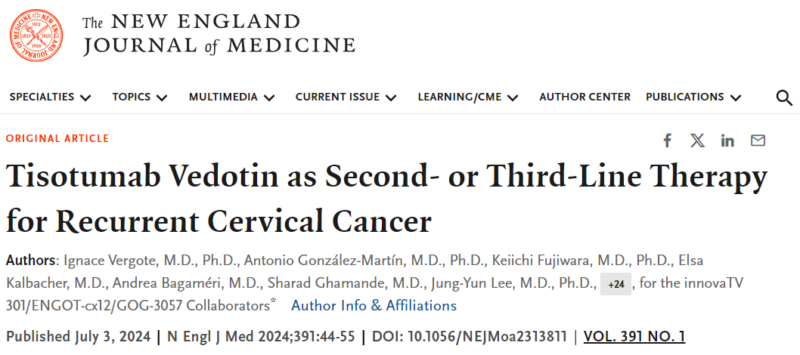
Piotr Wysocki: Tisotumab vedotin improves outcomes of patients with recurrent cervical cancer
Piotr Wysocki recently posted on LinkedIn:
“Vergote I et al. published results of a phase III study (TV 301/ENGOT-cx12/GOG-3057) comparing tisotumab vedotin (tissue factor [TF]-targeting antibody-drug conjugate linked to monomethyl auristatin E) with chemotherapy of physician choice (CPC) for recurrent or metastatic cervical cancer. The study randomized 502 patients (1:1) to tisotumab vedotin (TV) or CPC (gemcitabine, vinorelbine, irinotecan, pemetrexed, topotecan). Patients were diagnosed with squamous-cell carcinoma (63.2%), adenocarcinoma (33.6%), or adenosquamous carcinoma (3.2%). The primary endpoint was overall survival.
After a median follow-up of 10.8 months, the results were as follows:
- median overall survival – 11.5 months (TV) and 9.5 months (CPC) – HR=0.70; 95% CI, 0.54 to 0.89; P=0.004.
- median progression-free survival – 4.2 months (TV) and 2.9 months (CPC) – HR=0.67; 95% CI, 0.54 to 0.82; P<0.001.
- objective response rates – 17.8% (TV) and 5.2% (CPC) – OR=4.0; 95% CI, 2.1 to 7.6; P<0.001.
- Adverse Events:
– Any adverse event: 98.4% (TV) and 99.2% (CPC)
– Grade 3 or greater: 52.0% (TV) and 62.3% (CPC)
– Treatment discontinuation due to toxic effects: Tisotumab vedotin 14.8%.
This study demonstrates that tisotumab vedotin significantly improves overall survival, progression-free survival, and objective response rate compared to chemotherapy despite a high incidence of adverse events. The benefit of TV in recurrent cervical cancer was observed irrespectively of histological type.
However, a subgroup analysis demonstrated that TV’s superior activity seemed to be limited to patients previously treated with bevacizumab. This observation is not a surprise since VEGF rebound occurring after cessation of bevacizumab treatment strongly increases the tissue factor expression in ovarian cancer cells.
- bevacizumab – HR for OS= 0.57 (95%CI 0.42-0.78); HR for PFS= 0.59 (95%CI 0.46-0.76)
- no bevacizumab – HR for OS= 1.00 (95%CI 0.66-1.50); HR for PFS=0.83 (95%CI 0.59-1.16)”
Tisotumab Vedotin as Second- or Third-Line Therapy for Recurrent Cervical Cancer
Authors: Ignace Vergote, Antonio González-Martín, Keiichi Fujiwara, Elsa Kalbacher, Andrea Bagaméri, Sharad Ghamande, Jung-Yun Lee, Susana Banerjee, Fernando Cotait Maluf, Domenica Lorusso, Kan Yonemori, Els Van Nieuwenhuysen, Luis Manso, Linn Woelber, Anneke Westermann, Allan Covens, Kosei Hasegawa, Byoung-Gie Kim, Miriam Raimondo, Maria Bjurberg, Felipe Melo Cruz, Antoine Angelergues, David Cibula, Lisa Barraclough, Ana Oaknin, Christine Gennigens, Leo Nicacio, Melinda Siew Leng Teng, Elizabeth Whalley, Ibrahima Soumaoro and Brian M. Slomovitz.

Source: Piotr Wysocki/LinkedIn
Piotr Wysocki leads the Clinical Oncology Department at University Hospital and the Faculty of Oncology at Jagiellonian University-Medical College in Krakow, Poland. As an advisor to the Polish Ministry of Health, he shapes the national cancer strategy.
His clinical expertise spans the systemic treatment of breast, gynecologic, and genitourinary cancers, with a focus on developing innovative metronomic chemotherapy-based therapies for advanced cancer patients who have undergone prior treatment.
Read other posts by Piotr Wysocki published on OncoDaily.
